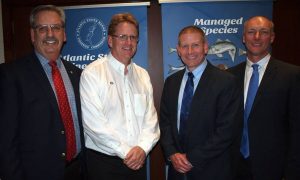March 28, 2022 — The following was released by the Atlantic States Marine Fisheries Commission:
As a reminder, the Atlantic States Marine Fisheries Commission’s American Lobster Management Board will meet via webinar this Thursday, March 31st from 1 – 3:30 PM. At this meeting, the Board will consider final approval of American Lobster Draft Addendum XXIX and Jonah Crab Draft Addendum IV. The Draft Addenda consider implementing electronic vessel tracking requirements in the federal American lobster and Jonah crab fisheries. The draft agenda and meeting materials are available at http://www.asmfc.org/files/Meetings/AmLobsterBoard_March2022/AmLobsterBoardMaterials_March2022.pdf.
To register for the webinar go to https://attendee.gotowebinar.com/register/3605881790361602063 (Webinar ID 951-453-683). If you are joining the webinar but will not be using VoIP, you can also call in at +1 (562) 247-8422. A PIN will be provided to you after joining the webinar; see webinar instructions for details on how to receive the PIN as well as how to navigate the webinar. For those who will not be joining the webinar but would like to listen in to the audio portion only, you can do so by dialing +1 (562) 247-8422, access code 706-332-029. The webinar will begin 30 minutes prior to the meeting to allow Board members and other participants to check their webinar connectivity and audio. If you are experiencing issues with either, please contact Chris Jacobs at 703.842.0790.
The webinar will allow registrants to listen to the Board’s deliberations and view presentations and motions as they occur. The Board will provide the public the opportunity to bring matters of concern to the Board’s attention at the start of the meeting. The Board Chair will ask members of the public to raise their hands to let the chair know they would like to speak. Depending upon the number of commenters, the Board Chair will decide how to allocate the available time on the agenda (typically 10 minutes) to the number of people who want to speak.
For more information, please contact Caitlin Starks, Senior FMP Coordinator, at cstarks@asmfc.org.

